|

November 2011
from
PaleoDietLifeStyle Website
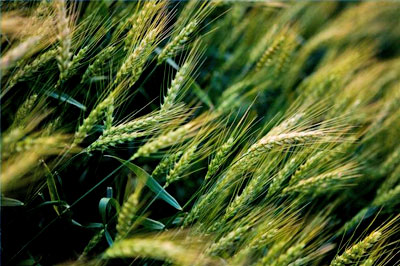
Iíve talked about how
grains in general are a poor choice for your
health, but gluten containing grains like wheat, barley and rye
require special attention because they can be particularly damaging
to your health.
All grains, including other non-gluten containing
grains like oats and corn, are bad because they contain gut
irritating
lectins and mineral binding
phytates, but youíll learn
here why gluten-containing grains and wheat especially can not only
cause the same problems as other grains, but also cause much more
trouble down the road.
Three main constituents are of interest here:
...found in wheat.
Gluten is a
compound protein that composes about 80% of the protein found in
wheat, barley and rye and WGA is a lectin found in wheat that can be
particularly damaging.
Opioid peptides are psychoactive chemicals
and those found in wheat are similar to those found in other well
known psychoactive drugs like opium or morphine.
Contrary to what is believed by many, wheat is not to be avoided
only by those who suffer
Celiac disease, the autoimmune disease
caused by a reaction of the immune system against gliadin, a gluten
protein.
Those with Celiac disease only react more strongly to wheat
and gluten than those without the disease, but most people have a
reaction in some way or another to wheat consumption, often in
insidious ways.
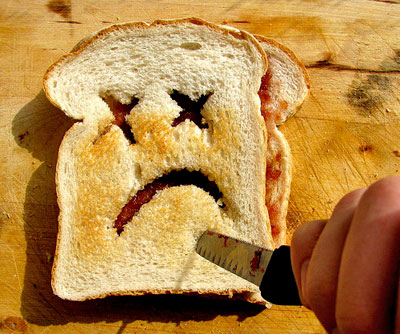
Bread is bad for you
Here are 11 reasons why consuming wheat or any of the gluten
containing grains can be very detrimental to ones health:
Gluten
-
Gluten causes gut inflammation in at least 80% of the population and
another 30% of the population develops antibodies against gluten
proteins in the gut. Furthermore, 99% of the population has the
genetic potential to develop antibodies against gluten. Antibodies
acting in the gut can actually be good news, because when the body
doesnít react against gluten right away, gluten proteins can enter
the blood stream more easily, especially if the gut is already
leaky, and trigger immune reaction elsewhere in the body.
-
Since gliadin, the main problem causing gluten protein, can be
similar in structure to other proteins found in tissues of such
organs as the thyroid or the pancreas, antibodies against gliadin
can end up attacking those organs and ultimately cause autoimmune
diseases like hypothyroidism and type 1 diabetes.
-
Glutenís inflammatory effect in the gut causes intestinal cells to
die prematurely and causes oxidation on those cells. This effect
creates a leaky gut and a leaky gut can allow bacterial proteins and
other toxic compounds to get in the blood stream, which can also
lead to autoimmune attacks on the body. A leaky gut also means that
food as not digested properly and nutrients are not absorbed fully,
which can lead to nutrient deficiencies.
-
Antibodies against gluten have also been shown to attack heart
tissues and cause heart disease.
-
Gluten has been strongly associated with cancer. It is potentially
cancer causing, but at least cancer promoting.
WGA (wheat germ agglutinin)
-
WGA, like gluten, irritates and causes premature cell death in the
gut and leads to a leaky gut condition, with all the detrimental
effects that are known to follow.
-
WGA also disrupts the mucus membrane in the gut, which can cause
bacterial overgrowth and lead to a host of digestive issues like
GERD and ulcers.
-
The lectin also often ends up circulating in the body and in the
brain, where it can cause leptin resistance and cause effects
similar to insulin. Those two factors could be a cause or promoter
of obesity as leptin and insulin are the two most important hormones
to properly regulate in order to maintain a normal weight and energy
balance.
-
WGA and another unknown factor in wheat cause vitamin D stores to
deplete abnormally fast and can therefore lead to vitamin D
deficiency, with all its accompanying issues like weakening of the
bones, a weakened immune system and a vulnerability to infectious
diseases and bacterial attacks.
Opioid peptides
-
The opioid peptides found in wheat are known to cause addiction to
wheat in some people and withdrawal symptoms can happen upon the
removal of wheat from the diet.
-
They have also been associated with Schizophrenia as a possible
cause or at least as a promoter of the disease. Furthermore,
Schizophrenics often see their symptoms reduce by a lot when
removing wheat from their diet.
Conclusion
When it comes to things that we, humans, are not adapted to eat and
digest, wheat and its gluten protein is probably at the top of the
list.
Itís very sad that wheat is so omnipresent in our society
though and many health conditions would probably not even exist if
it were not for our high consumption of wheat.
Positive changes are
often noticed immediately after removing wheat and other gluten
containing grains from the diet.
Even though most people can indulge in less healthy choices from
time to time without negative consequences, wheat and other gluten
containing grains should, in my opinion and the opinion of many
others in the Paleo diet blogosphere, be completely avoided,
especially for those who suffer any kind of autoimmune disease or
inflammatory condition.
What Is Wrong With Grains
September 2011
from
PaleoDietLifeStyle Website
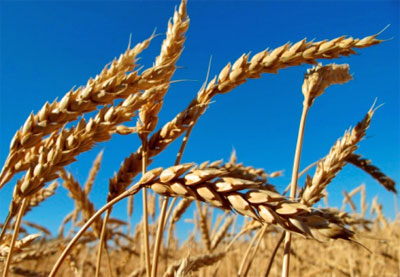
As you probably know, weíve been eating
grains, refined or whole, only since the beginning of agriculture
some 10 000 years ago.
The problem is that our genes where
formed about 2 million years ago and havenít changed much since
then, nor did our digestive systems. Eating structurally and
chemically different foods is therefore more often than not asking
for problems. Grains are miles away from what our bodies should be
processing.
In fact, grains arenít really a good thing for any mammal. Weíre
better off leaving them to the birds, who have a system adapted to
them.
The problem is that our food system is so skewed in the wrong
direction that everybody now thinks that grains, especially whole
grains, are healthy and nutritious. Grains, a food group that we
didnít eat for 97% of our human existence, are now at the bottom of
the USDA food pyramid with a recommended 6 to 11 servings per day.
This is amazingly wrong!
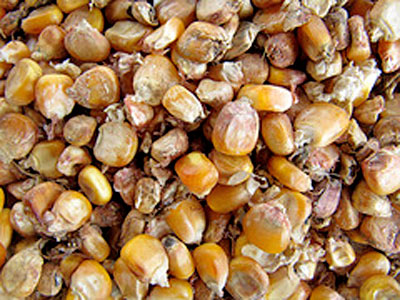
Be aware that the reason why governments
pushed grains in the first place were economical:
-
they are cheap to produce
(although not without environmental costs)
-
they can be stored for much
longer
-
they can be sold overseas much
more easily
In fact, itís now one of the few things
that the US successfully sells overseas, so I wouldnít count on them
to stop promoting them as the healthiest thing around. Sad but true!
Now on to why exactly grains are probably one of the worst mistakes
human kind made.
High carbohydrate
intake and elevated insulin

Chronically elevated insulin levels is
indeed the number one problem we now have as a society.
In a few words, blood sugar has to stay
between a very narrow range, otherwise you would die. Insulinís main
job is to lower blood sugar levels after you consume any form of
sugar or carbohydrate (theyíre converted to sugar anyway).
When insulin has to deal with so much
sugar that it doesnít know what to do with it anymore, it stores it
as fat.
Also, when insulin is always high,
inflammation begins and cells become resistant to insulin, so your
pancreas has to produce even more of it. When your cells have become
resistant to insulin, youíve become diabetic. This is the new
epidemic of westernized countries that we also call the metabolic
syndrome.
Guess what, the main food source of carbohydrate in our diet are
grains (wheat, corn, rye, oats, barley, riceÖ). Breads and pastas
are mostly made of wheat. Without grains, people wouldnít get fat
and wouldnít have high insulin levels.
Try to get 300g, USís recommended daily
intake of carbs, with vegetables and fruits. Youíll have to eat
buckets of them.
Bread, cookies, cakes, crackers, rice, pasta, pastries and breakfast
cereals are all staples and consumed at almost every meal by almost
everybody. This leads to a high carbohydrate load at every meal and
this is why people get hungry all the time and have so much
fluctuation in their energy levels (blood sugar levels are
unstable).
Your grand-mother knew that potatoes and pastas are fattening, maybe
we should listen to her wise words.
Donít worry, replacing carbs by fat sources will not kill you.
For all human evolution, weíve been
eating animal meat and fat with some vegetables, fruits and nuts in
the mix and yet observations demonstrate that caveman was lean,
strong and healthy.
Gluten,
lectins and phytates, three poisons you can live without
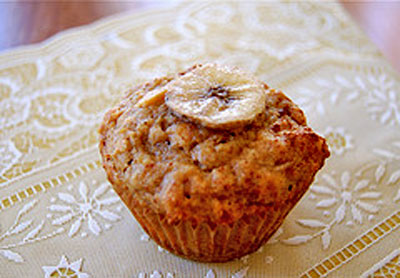
Living organisms all develop ways to
protect themselves against preys and invaders.
Itís the basis of our survival
mechanisms. Animals can usually run or attack, but plants have to
find another way. In fact, most plants contain some form of toxins
so animals canít eat too much of them before getting sick.
The only part of a plant that wants to be eaten are fruits, and this
is not without a purpose.
Fruits contain seeds that we and other
animals canít digest so we evacuate them elsewhere and help
propagate the plant to new horizons. Itís a fair partnership after
all. Itís not by accident that plants produce fruits, it takes up
most of its resources do to so.
Grains are not different from most plants and in certain regards
theyíre much worse. Grains are the offsprings of soon to become
grasses so they need even more protection in the beginning to ensure
other species stay far away.
Other than that, they also contain
toxins that inhibit their own growth until they have what they need
to grow (soil and water).
Gluten
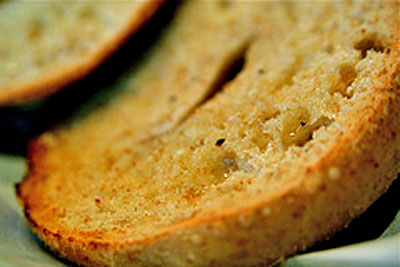
Gluten is, arguably, the worst offender.
You can find gluten in wheat, rye and barley.
Donít forget that wheat is absolutely
everywhere today. You probably already know that those who have
Celiac disease canít have even a tiny bit of it or else theyíre in
for big trouble.
What you might not know though is that 30% of the population have
noticeable amounts of anti-gliadin in their stools.
Anti-gliadin are antibodies
secreted when the body sees gliadin, one of glutenís constituent, as
an intruder. Having the antibody in your stools means that your body
is actively fighting an intruder and that you already have a low
level of chronic inflammation, the source of all modern diseases.
Gluten also has this weird ability to mimic certain proteins and to
make its way into your cells, then wreaking havoc and making you
develop autoimmune diseases where the body attacks itself (Chronís
disease is an example).
Lectins
Lectins are other toxins present in all
grains that cause their load of problems.
First, they damage the gut lining and a
damaged gut lining is an inflamed gut lining that will have
difficulty absorbing nutrients. This also leads the way to colon
cancer.
Lectins also causes leptin resistance,
which means that your hunger signal is suppressed and that youíll be
hungry even when your body has had more than enough calories.
Phytates

This other set of toxins, also found in
lesser quantities in nuts and seeds, bind to nutrients and robs them
from your body.
You can then think twice when you think
that eating grains will feed you loads of nutrients. Phytates make a
good job of making them less bio-available. All this list of
nutrients on a bag of sliced bread is only a small proportion of
what your body will really be able to get.
Do you think that grains can beat any vegetable or fruit nutrition
wise or that youíll find some nutrients only in them?
The answer is NO!
Conclusion
I sincerely hope that this article helped shed some light on the
problems caused by this group of food that is so popular.
Of all the habits that you can develop, dropping the grains off your
diet is probably the one that will pay off the most
|








